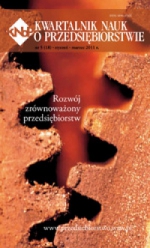The Demise of Industrialism and What It Means to Business Education
Main Article Content
Abstrakt
In the global economy work based on the creativity of the people becomes increasingly important. Thereby the conditions under which it is carried out are changing. The current model of employment shaped in the industrial age, when employees could work only in a certain place and time, does not responds more to new challenges. As a result, not only changes the style of work, but also the lifestyle of people employed in the sectors of the creative economy. Analyzing the nature of these changes the author wonders what, in turn, should be changed in the education system, in order to enable proper preparation of graduates to exercise this type of work.
Downloads
Article Details
Autor (Autorzy) artykułu oświadcza, że przesłane opracowanie nie narusza praw autorskich osób trzecich. Wyraża zgodę na poddanie artykułu procedurze recenzji oraz dokonanie zmian redakcyjnych. Przenosi nieodpłatnie na Oficynę Wydawniczą SGH autorskie prawa majątkowe do utworu na polach eksploatacji wymienionych w art. 50 Ustawy z dnia 4 lutego 1994 r. o prawie autorskim i prawach pokrewnych – pod warunkiem, że praca została zaakceptowana do publikacji i opublikowana.
Oficyna Wydawnicza SGH posiada autorskie prawa majątkowe do wszystkich treści czasopisma. Zamieszczenie tekstu artykuły w repozytorium, na stronie domowej autora lub na innej stronie jest dozwolone o ile nie wiąże się z pozyskiwaniem korzyści majątkowych, a tekst wyposażony będzie w informacje źródłowe (w tym również tytuł, rok, numer i adres internetowy czasopisma).
Osoby zainteresowane komercyjnym wykorzystaniem zawartości czasopisma proszone są o kontakt z Redakcją.
Bibliografia
2. Bianchini F., The 24-hour city, [in:] Well-being and time, "Demos Quarterly', 1995, Issue 5.
3. Bhayani P.D., Surveying the Class, Harvard Crimson, June 1, 2009.
4. Cacérès B., Loisir et travail du Moyen Age à nos jours, Édition du Seuil, Paris 1975.
5. CISCO report 2010: http://www.enterprisecommunications.eu/news/417-new-cisco-study-shows- -employers-disconnected-from-workers-social-media-communication-needs.html, accessed December 22, 2010.
6. Clarkberg M., The Time-squeeze in American families: from causes to solutions, US Department of Labour, www.dol.gov (5.X.2008), accessed 08-10-05.
7. Dumazedier J., Vers une Civilisation du Loisir, Éditions du Seuil, Paris 1974.
8. Florida R., The Flight of the Creative Class. The New Global Competition for Talent, Harper Business/Harper-Collins Publishers, New York 2005.
9. Florida R., The Great Reset. How new ways of living and working drive post-crash prosperity. Harper Collins, New York 2010, 107, 113, 117, 133, 718.
10. Florida R., The Rise of the Creative Class… and how it's transforming work, leisure, community and everyday life, Basic Books, Perseus Book Group, New York 2002.
11. Florida R., Who's Your City? How the creative economy is making where to live the most important decision of your life, Basic Books, New York 2008.
12. Frey B.S., Arts & Economics. Analysis & Cultural Policy, Springer, Berlin 2003.
13. Fried J., Hansson D.H., Rework. Change the way you work forever, Vermillion, London 2010.
14. Howkins J., The Creative Economy. How People Make Money from Ideas, Penguin Books, London 2002.
15. Jung B., Media ery Web 2.0, Waip, Warszawa 2010.
16. Jupiter Study: http://www.medialifemagazine.com/cgi- bin/artman/exec/view. cgi?archive=170&num=2581, accessed Sept. 30, 2008.
17. McKinlay A., Smith Ch. (eds.), Creative Labour working in the creative industries, Palgrave, Macmillian, London 2009.
18. Linder S., The Harried Leisure Class, Columbia University Press, Irvington, NY 1970.
19. Occupation and Employment Statistics 1999, Employment and Earnings, U.S. Bureau of the Census, Statistical Abstract of the United States 2000, Washington DC 2000, Table 669.
20. Pine J., Gilmore J., The Experience Economy: Work is Theatre and Every Business is a Stage, Harvard Business School Press, Boston 1999.
21. Ray P.H., Anderson S.H.R., The cultural Creatives. How 50 million people are changing the world, Three Rivers Press, New York, 2000.
22. Rifkin J., The Age of Access. How the shift from ownership to access is transforming modern life, Penguin Books, London 2000.
23. Robinson J., Godbey G., Time for Life. The Surprising Ways Americans Use Their Time, 2nd edition,University Park, the Pennsylvania State University Press, 1999.
24. Robinson K., http://www.ted.com/index.php/talks/ken_robinson_says_schools_kill_creativity. html, accessed on Nov. 3, 2010.
25. Sahlins M., Stone Age Economics, Routledge, London, New York 1972.
26. Schor J., The Even More Overworked American, Harper Perennial, New York 1999.
27. Schor J., The Overworked American: The Unexpected Decline Of Leisure, Basic Books, New York 1992.
28. Stebbins R., Casual and Serious Leisure and Post-traditional thought in the information age, World Leisure and Recreation, No. 3, 1996, Vol. 38.
29. Sullivan O., Gershuny J., Inconspicuous Consumption: Work-Rich, Time-Poor in the Liberal Market Economy, “Journal of Consumer Culture”, March 1, 2004.
30. Tapscott D., Williams A.D., Macrowikinomics. Rebooting Business and the World, Portfolio/Penguin, New York 2010.
31. Tapscott D., Williams A.D., Wikinomics. How Mass Collaboration Changes Everything, Portfolio, Penguin Group, New York 2006.
32. The Challenge of Assessing the Creative Economy: towards informed Policy-making, Creative Economy Report 2008, UNDP/UNCTAD, New York 2008.
33. Throsby D., Economics and Culture, Cambridge University Press, Cambridge 2001.
34. Toffler A., The Future Shock, Bodley Head, London 1970.
35. Toffler A., Third Wave. The Classic Study of Tomorrrow, Bantam Books, New York 1990.
36. Qualman E., Socialnomics. How Social media transforms the way we live and do business, John Wiley & Sons Inc., Hoboken, New Jersey, 2011

